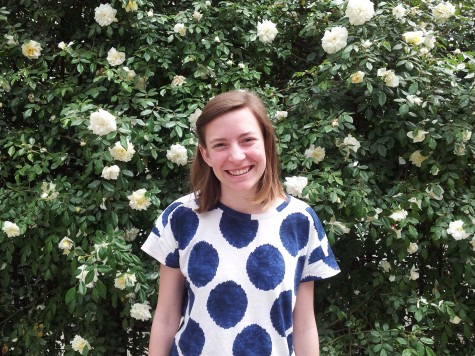Great Lakes Theater performs “As You Like It”
April 11, 2014
After the prologue, the play’s first scene opens with a spray of sparks as a man in dingy clothing uses a spinning saw. He is surrounded by grey scenery, which successfully creates the illusion of a smoke-filled factory. The scene is like an image from the Second Industrial Revolution come to life, and is paired with language from 300 years before.
Edward Morgan, the director of Great Lakes Theater’s “As You Like It” chose to set Shakespeare’s comedy in the early 20th century for a variety of reasons. “This play is about freedom, equality and making it based on merit,” said Morgan. “That sounded like Thoreau and transcendentalism.”
Morgan also thought Shakespeare’s emphasis on different settings fit this time period well. “The contrast between city dweller and country dweller is really extraordinary,” he said. This struggle between nature and civilization was also important in 20th century America, so the play’s themes and characters transferred well to a more modern setting, Morgan explained.
Shakespeare’s characters do fit well into modern roles, and the production’s changes feel true to the Renaissance source. In this production, greedy brothers who crave political power are wealthy Industrialists, and noble characters forced to flee are nature-loving outdoorsmen. Rosalind, the play’s famously saucy heroine, trades her long satin skirt for breeches when she disguises herself as a boy to escape her wrathful uncle. Betsy Mugavero plays the multi-faceted Rosalind well, and naturally slips in and out of Rosalind’s own creation, the male Ganymede. These character fluctuations, usually in response to Rosalind’s love interest Orlando, are believable in their subtlety. Mugavero transitions between personas gracefully, using tone and body movements that echo her lines.
“Shakespeare takes enormous liberties with what women in his play say,” said Charles Fee, the producing artistic director for Great Lakes Theater. “Rosalind is bending sex roles a lot. The women in this play are like Hamlets, they’re very intelligent. They’re smarter than all the guys.”
Rosalind is not the only subversive character in the play. “Orlando is a unique male character,” said Fee. “Rosalind’s shift in a woman’s role is accompanied by a shift in his role. He is often described as gentlemanly.”
Torsten Johnson plays the handsome Orlando, an often comic character who ties his love poetry to the boughs of trees. Johnson’s Orlando is persistent but simple in his goodness, and he and Mugavero have good chemistry. They work well together in both romantic and comic scenes.
Dustin Tucker also brings the play’s comedy to life as Touchstone, the court fool. He pairs his bawdy lines with lively physical comedy, giving the play bizarre elements. Like many of Shakespeare’s clowns, Touchstone hides a vaguely threatening personality behind his comedy, a detail Tucker conveys nicely. Although his performance is attention getting, his slapstick humor does not distract from the rest of the story.
The character Jaques balances out Touchstone’s exuberance. The courtier, played by David Anthony Smith, acts as the satiric version of a melancholy poet. He also brings an unsettling dark current to the comedy.
“Jaques stands on the border of that which is serious and that which is comic,” said Morgan. “He takes things too seriously, whereas Touchstone takes things too lightly.”
This combination of lightness and seriousness is repeated throughout the play. “The first half focuses on life and death matters, it’s a drama, really,” said Morgan.
Even the later parts of the comedy have somber elements. “We have a real minor chord near the end,” said Fee. “It’s almost experimental on the part of Shakespeare.”
The tone of the original lines combines well with this production’s updated setting. A few of the updates, like the banished courtiers’ obsession with posing for photographs, are cute but somewhat unnecessary. Still, these stark contrasts help to increase the play’s serious and dramatic aspects.
“As You Like It” plays in the Hanna Theater downtown through April 19. Student tickets are 13 dollars.



